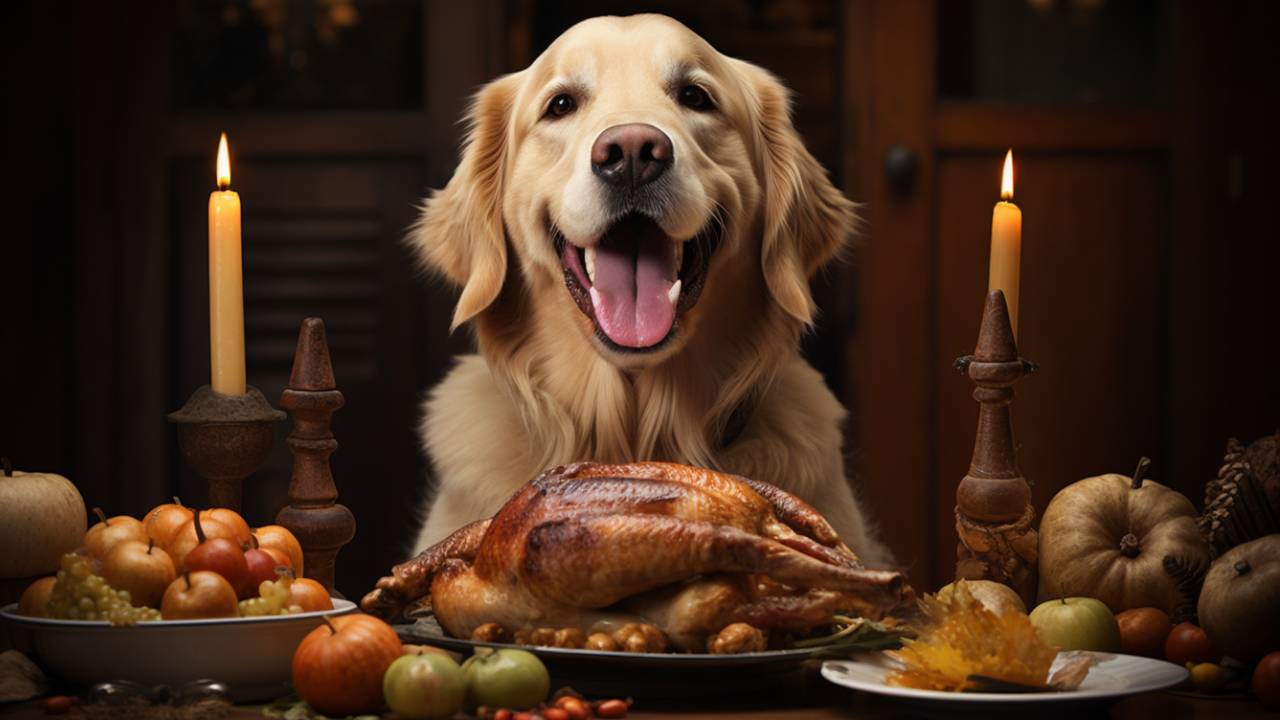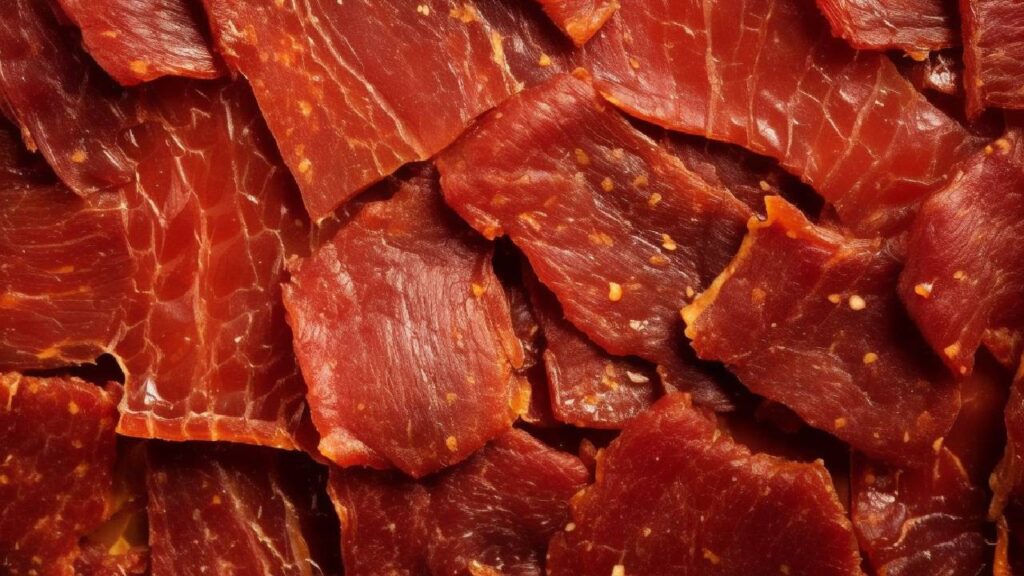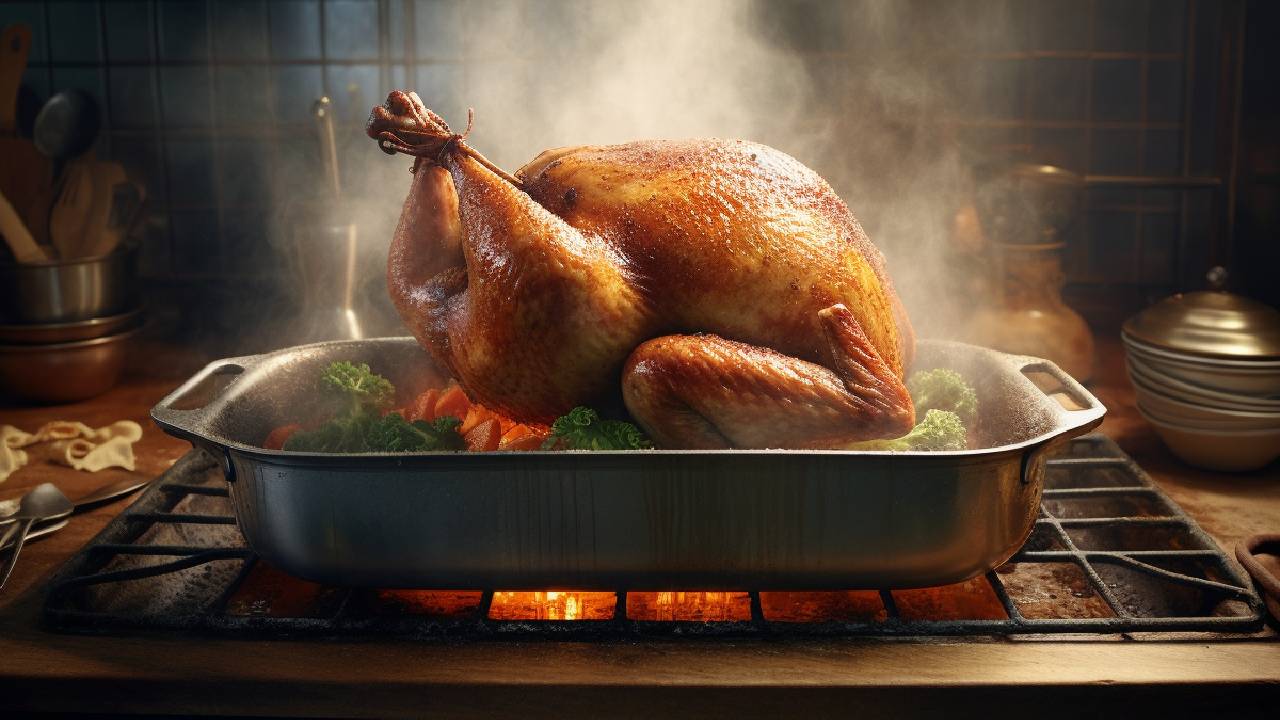Thanksgiving, a time for gratitude and togetherness, often involves sharing hearty meals with loved ones. It’s no wonder our dogs want to partake in the festivities. But amidst the holiday cheer and family gatherings, a question nags at every dog owner: “Is turkey bad for dogs?”
This article delves deep into the delectable world of dogs and turkey, exploring the merits and perils of this popular poultry. Thanksgiving and dog food may seem synonymous, but we must know the facts.
We’ll uncover the risks of giving turkey to dogs so you can keep your pet happy and healthy during the holiday season.
Is Turkey Meat Safe for Dogs?
Yes, turkey meat can be safe for dogs when prepared and served appropriately. Turkey offers our canine friends several nutritional and health benefits.
Benefits of Turkey Meat for Dogs
- Lean Protein Source: Turkey is a superb source of lean protein for building and repairing your dog’s muscles and tissues. High-quality protein helps maintain your dog’s overall health and supports a shiny coat and strong bones.
- Nutrient-Rich: Besides protein, turkey contains essential nutrients such as B vitamins (particularly B3 and B6), phosphorus, and selenium. These nutrients contribute to your dog’s energy, immune system, and overall vitality.
- Low-Fat Content: Turkey is relatively low in fat compared to other meats, making it an ideal choice for dogs with weight management concerns or those prone to pancreatitis. The lean nature of turkey can help maintain a healthy weight and reduce the risk of digestive issues.
- Easy to Digest: Turkey is gentle on a dog’s digestive system, making it suitable for dogs with food sensitivities or allergies. If your pup has a sensitive stomach, turkey can be a flavorful yet easily digestible protein source.
- Natural Source of Tryptophan: Turkey contains tryptophan, an amino acid that helps regulate mood and promotes relaxation. This can be particularly beneficial for anxious or stressed dogs, potentially contributing to a calmer disposition.

The Hidden Risks of Feeding Turkey to Dogs
Turkey Bones
While a dog’s instinct might be to gnaw on a bone, turkey bones can splinter easily and cause serious harm. These sharp bone fragments can puncture the digestive tract or pose a choking hazard. Ensure turkey bones are securely discarded where your dog can’t access them.
Turkey Skin and Dogs
Turkey’s skin is often loaded with fats, leading to digestive upset, pancreatitis, or other health issues in dogs. Resist the urge to share this delectable part of the turkey with your canine companion.
Raw Turkey
Never feed your dog raw turkey. Raw poultry carries the risk of harmful bacteria like salmonella, which can lead to severe gastrointestinal distress for both dogs and humans. Ensure that any turkey your dog consumes is fully cooked to eliminate these health risks.
Seasoned Turkey
Seasoned turkey, often flavored with garlic, onions, herbs, or spices, is a no-go for dogs. Many seasonings used in cooking are toxic to dogs and can lead to various issues, from upset stomachs to more severe health problems. Plain, unseasoned turkey is the safest option if you’d like to share this meat with your dog.
Thanksgiving Precautions for Dog Owners
Now that we’ve covered the potential dangers of turkey, let’s discuss some precautions dog owners should take to ensure a safe and enjoyable Thanksgiving for their pets.
1. Secure the Trash
After the feast, securely dispose of turkey bones and other food scraps. Dogs are notorious for getting into trash cans; the last thing you want is your pup finding discarded turkey bones.
2. No Table Scraps
Advise your guests not to sneak your dog any table scraps, especially if they contain turkey skin, bones, or seasoned meat.
3. Safe Storage
Store leftovers out of your dog’s reach. Dogs can find food, so ensure that any turkey or other Thanksgiving dishes are securely stored.
4. Watch the Gravy
Gravy, often used as a topping for turkey and other dishes, can be high in fats and seasonings. Avoid letting your dog indulge in gravy-laden foods.
5. Maintain Their Routine
While letting your dog partake in the festivities is tempting, stick to their regular feeding schedule. Sudden changes in diet can upset their stomach.

Safe Turkey Consumption for Dogs
How to Prepare Turkey Meat for Dogs 🍗
Cook it Thoroughly
Always cook turkey meat thoroughly to eliminate the risk of harmful bacteria. Boiling or roasting turkey is a safe method. Ensure there are no seasonings, spices, or sauces added.
Remove Bones and Skin
Before serving turkey to your dog, meticulously remove all bones and skin. This minimizes choking hazards and reduces the risk of pancreatitis associated with fatty skin.
Cut into Small Pieces
Slice the turkey into small, manageable pieces to prevent choking and make it easier for your dog to digest.
Plain and Unseasoned
Dogs should only consume plain, unseasoned turkey. Avoid garlic, onions, salt, or other seasonings, as they can harm your pet.
Portion Control
Remember, moderation is key. Too much turkey, even when prepared safely, can upset your dog’s stomach. Stick to appropriate portions based on your dog’s size and dietary needs.
Safe Turkey Treats for Your Dog 🦃
Turkey Jerky
Opt for commercially produced, dog-specific turkey jerky treats free from additives and preservatives. Homemade turkey jerky can also be a great option if prepared without seasonings.
Turkey-Based Dog Food
Some dog food brands offer turkey-flavored kibble or wet food. These are formulated with dogs’ nutritional needs in mind and can be a safe way to incorporate turkey into their diet.
Turkey Broth
Make a simple turkey broth by simmering turkey meat in water. This can be a tasty and hydrating treat for your pup, especially when served in small amounts.
Turkey Treats
Look for dog-friendly turkey treats at pet stores. These are often designed to be both delicious and safe for your pet.
DIY Treats
If you enjoy baking, you can make your turkey treats at home. Use turkey meat without seasonings and create bite-sized treats for your dog.
Conclusion
Sharing special moments with our pets is one of the joys of pet ownership, and by following safe practices, you can enjoy a harmonious and memorable Thanksgiving with your furry friend by your side.
So, as you savor your holiday meal, may your dog’s tail wag with happiness, and may your bond with them continue to grow stronger each passing year.

FAQs
How Do I Know If My Dog Is Allergic to Turkey?
You can identify a potential turkey allergy in your dog by observing symptoms like itching, skin irritations, digestive issues (vomiting or diarrhea), excessive gas, or changes in behavior after consuming turkey.
Is Turkey Safe for Pregnant or Nursing Dogs?
When prepared plain and fully cooked, Turkey can be safe for pregnant or nursing dogs. It provides essential nutrients like protein. However, consult your veterinarian for portion recommendations and dietary adjustments to meet your dog’s needs.
How Much Turkey Can Dogs Eat?
Dogs can eat turkey in moderation. The amount depends on their size, but a small portion of cooked, plain turkey without bones or skin can be a safe treat. Avoid overfeeding, as excessive turkey consumption can lead to digestive upset.
Can Dogs Eat Turkey Burgers?
Dogs can eat plain, unseasoned turkey burgers in moderation. Avoid toppings, spices, or seasonings. Ensure the burger is fully cooked and free of onions, garlic, and other harmful ingredients, and remove any bones before feeding it to your dog.
What Herbs or Spices Can Be Added to Turkey for Dogs Without Harm?
Plain herbs like parsley or basil can be added sparingly to cooked, unseasoned turkey for dogs. Avoid using spices or herbs that contain ingredients toxic to dogs, such as garlic, onion, or excessive salt.
What Do I Do If My Dog Vomits or Has Diarrhea After Eating Turkey?
If your dog vomits or has diarrhea after eating turkey, it’s essential to withhold food for 12-24 hours to let their stomach settle. Offer small sips of water to prevent dehydration. If symptoms persist or worsen, contact your veterinarian for guidance.






With Thanksgiving around the corner, I need to know – can I share some turkey with my dog, don’t want to spoil his dinner!
I’m wondering if I can share some turkey with my Lab…
With Thanksgiving gotta be careful with the turkey scraps for my pup. Any dog-friendly turkey recipes to share?
Thanks for the heads up! 🦃🐾